

How to Be the Type of Person Everyone Wants to Know. Anam Cara and the Essence of True Friendship: Poet and Philosopher John O’Donohue on the Beautiful Ancient Celtic Notion of Soul-Friend. Don't Just Network — Build Your 'Meaningful Network' to Maximize Your Impact. Lifehacker. Isolation and Connectedness – Existential Therapy. Illuminati by Rich Bargdill An important point of convergence with humanistic and relational models occurs within this domain.
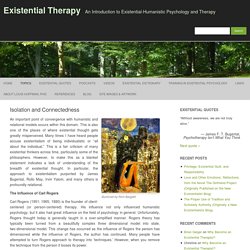
This is also one of the places of where existential thought gets greatly misperceived. Many times I have heard people accuse existentialism of being individualistic or “all about the individual.” This is a fair criticism of many existential thinkers across time, particularly some of the philosophers. How to Be More Persuasive. Where there is communication, there is influence—and today we’re communicating constantly.
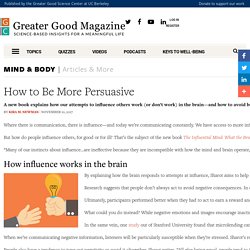
We have access to more information than ever before, and would-be influencers have more and more access to us. But how do people influence others, for good or for ill? That’s the subject of the new book The Influential Mind: What the Brain Reveals About Our Power to Change Others by neuroscientist Tali Sharot. She argues that we’re full of misconceptions about how minds get changed, which means that we often fail to influence others—our kids, our students, our coworkers, our patients, and our loved ones. Eli Finkel on His Theory of the All-or-Nothing Marriage. Tall, dark, handsome, funny, kind, great with kids, six-figure salary, a harsh but fair critic of my creative output ... the list of things people want from their spouses and partners has grown substantially in recent decades.

So argues Eli Finkel, a professor of social psychology at Northwestern University in his new book, The All-or-Nothing Marriage. As Finkel explains, it’s no longer enough for a modern marriage to simply provide a second pair of strong hands to help tend the homestead, or even just a nice-enough person who happens to be from the same neighborhood. The Secret To Getting Other People To Trust You Quickly. Psychiatrists and therapists face a daunting challenge.

They usually have only a short time after first meeting a patient to earn their trust. Showcasing expertise and credentials helps in that process, but it only goes so far. Showing vulnerability, it turns out, can be an enormously effective tool for helping you succeed in a range of situations. Here’s how. Why To Spill Your Coffee Tom, a psychiatrist, was one of our former executive education students. We can begin to answer this question by looking at a classic study led by Elliot Aronson at the University of Texas at Austin in the 1960s. Unbeknownst to the participants, Elliot and his team created four versions of the interview. A second version had this exact same beginning, but tacked onto the end of the interview was a pratfall: The candidate spilled coffee.
Are 'I' Statements Better than 'You' Statements? How Do You React to Someone Else's Good News? Ten Techniques for Building Quick Rapport With Anyone. **Warning – the content in this post is so effective that I encourage you to think carefully how it is used.
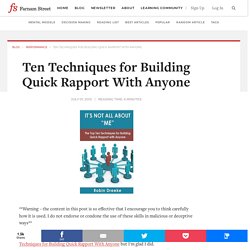
I do not endorse or condone the use of these skills in malicious or deceptive ways** I'm not quite sure how I came across Robin Dreeke‘s It's Not All About Me: Ten Techniques for Building Quick Rapport With Anyone but I'm glad I did. Robin is the lead instructor at the FBI’s Counterintelligence Training Center in all behavioral and interpersonal skills training. And he wrote an awesome book on how to master the skills of communication. His process not only includes research into social and evolutionary psychology, but it's been honed from years of field experience. I've been trying these out over the last few days and I've already noticed an improvement. There are not many places that teach these techniques and I couldn't have asked for a better guide than Robin. 1.
When you approach someone to start a conversation most people assess the situation for threat before anything else. 2. 8 Ways to Get a Difficult Conversation Back on Track. Executive Summary Even when we have the best intentions, work conversations frequently veer into difficult territory.

To prevent frustration, resentment, and wasted time and effort and increase your conversational agility, learn to use different tools and techniques that can bring even the most difficult conversations back on track. For example, you can reframe your relationship with your counterpart. In the midst of a difficult conversation, it’s easy to see your conversational partner as your opponent. Try repositioning yourself – both mentally and physically — side by side with the other person so that you’re focused on the same problem.
Despite our best intentions, conversations can frequently veer into difficult territory, producing frustration, resentment, and wasted time and effort. For example, when he spoke with Leela, the head of the school’s specialized online master’s degree programs, he shared his plan to increase enrollment in these programs to boost revenue. How to Handle a Toxic Relationship. Last week, I had lunch with a friend.
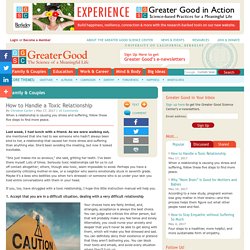
As we were walking out, she mentioned that she had to see someone who hadn’t always been kind to her, a relationship that caused her more stress and suffering than anything else. She’d been avoiding the meeting, but now it looked inevitable. “She just makes me so anxious,” she said, gritting her teeth. I’ve been there myself. Lots of times. If you, too, have struggled with a toxic relationship, I hope this little instruction manual will help you.
How to Stop Passive Aggression from Ruining Your Relationship. Every Saturday night, Bill and Sarah leave their son with a babysitter and go out to dinner.
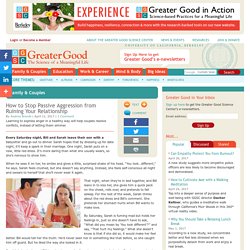
Sarah hopes that by dressing up for date night, it’ll keep a spark in their marriage. One night, Sarah puts on a new, little red dress. What Makes a Person Charismatic? For weeks I had been researching what science has to say about the power of charisma.

Why do some people so clearly have it and others don’t? Why do we fall so easily under its influence? Barking Up The Wrong Tree » This Is How To Overcome Social Anxiety: 5 Powerful Tips Backed By Research. Your mind races.
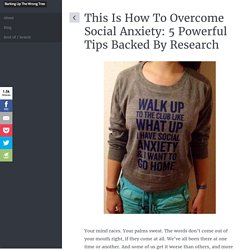
Your palms sweat. The words don’t come out of your mouth right, if they come at all. How to Stop Being a People-Pleaser. Many commentators took issue with my claim that happiness comes when we live with total integrity—when we stop people-pleasing and start living more authentically. I understand entirely why a lot of people fear the sort of transparency and honesty I’m advocating.
We are clannish beings, with nervous systems that evolved to profoundly fear being rejected by our tribe. Acceptance can feel like everything, and for some people, it can be a matter of survival. At the same time, for most of us, it is far better in the long run to be ourselves and risk having people not like us than to suffer the stress and tension that comes from pretending to be someone we’re not. Does this mean, though, that we never act in a way that doesn’t resonate with our mood? Is there anyone reading this who has not had an interaction with a law enforcement officer for at least a minor traffic issue? Granted, a traffic stop is a racial flashpoint and a huge public issue. This is where it gets tricky again. The One You’re With. This interview originally appeared in the July 2014 issue of The Sun. The One You’re With Barbara Fredrickson On Why We Should Rethink Love According to psychologist Barbara Fredrickson, the fundamental essence of love is the same across all relationships, whether between romantic partners, parents and children, or total strangers.
In her book Love 2.0: How Our Supreme Emotion Affects Everything We Feel, Think, Do, and Become, she claims that “love blossoms virtually anytime two or more people . . . connect over a shared positive emotion.” Fredrickson says that although such experiences may be fleeting, their physical and psychological effects lead to deeper bonds and even improved health. The secret to a conflict-proof relationship? Feeling like your partner understands you. A relationship under strain can be helped by a dose of understanding. In itself, this is no new insight, and it makes sense that understanding your partner and looking for mutual solutions is healthier than looking to win the argument or change them. But new research published in the Journal of Personality and Social Psychology suggests that quite aside from any practical value of understanding, simply feeling understood can nullify conflict’s impact – or even allow it to improve relationships.
Amie Gordon and Serena Chen at the University of California conducted several studies with participants recruited through online research pools, most of whom were in their twenties and thirties; all were in an ongoing relationship with at least six months behind it. This Is How To Read People: 5 Secrets Backed By Research. We’d all like to learn how to read people like Sherlock Holmes. And research shows understanding things like body language is even more powerful than you might think. What it Really Means to Hold Space for Someone. The Powerful Predictor Behind Successful Relationships.
Are Boundaries Overrated? “Be independent.” The Alan Kazdin Method for Making Your Children Behave. Say you have a problem child. If it’s a toddler, maybe he smacks his siblings. Faux Friendship. William Deresiewicz discusses the shaky future of friendship on New Hampshire Public Radio's Word of Mouth Wednesday, December 16 at 12:40 p.m.
Faux Friendship. Signs of an Emotionally Abusive Relationship. Unlike physical or sexual abuse, emotional abuse can be much harder to pinpoint and recognize. Emotional abuse often is inconsistent in amount and duration and happens in multiple forms. How To Be Charming: 2 Secrets Backed By Research. The Secret To Getting Other People To Trust You Quickly. Psychiatrists and therapists face a daunting challenge. They usually have only a short time after first meeting a patient to earn their trust. Showcasing expertise and credentials helps in that process, but it only goes so far. My Favorite Heuristic for Evaluating Relationships: The Antifragile Person. Afraid of Love: 2 Fears That Keep People Single.
Love is Not Enough. 6 Toxic Relationship Habits Most People Think Are Normal. Masters of Love. The Gottman Relationship Blog. The 4 Most Common Relationship Problems. The Powerful Predictor Behind Successful Relationships. The one surprising thing that can make every marriage work: logic. How To Master The Fine Art Of Small Talk. How To Be Someone People Love To Talk To. 6 Powerful Communication Tips From Some Of The World's Best Interviewers. 3 Improv Comedy Tricks To Supercharge Your Social Life. How To Deeply Connect With Anyone. Can These Questions Make You Fall In Love? How To Connect With People. 6 science-based tips for making friends. How To Get People To Like You: 7 Ways From An FBI Behavior Expert.
Interview - Harvard/MIT Lecturer Olivia Fox Cabane teaches you how to be more charismatic. How to Look Smarter. How to remove self-importance from self-promotion and still be your badass self — She Negotiates. "Nice guys finish last." Really? What does the research say? 12 Reasons A-Holes Win and You Don't. How To Read People Like Sherlock Holmes: 4 Insights From Research. Who Can You Trust? How to Be Alone: An Antidote to One of the Central Anxieties and Greatest Paradoxes of Our Time.
Mixed Signals: Why People Misunderstand Each Other.